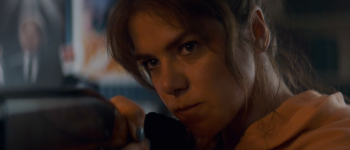Image Caption
Local Journalism Initiative Reporter
Windspeaker.com
Kaniehtiio Horn was keen to display her acting abilities.
And thus Horn, a member of Kahnawake Mohawk Territory in Quebec, decided to take matters into her own hands.
Horn wrote, directed and is also the star of a comedic thriller titled Seeds, which will start screenings at theatres across Canada on Oct. 25.
Seeds had its world premiere at the Toronto International Film Festival last month.
“I think my inspiration was basically creating something for myself to showcase my abilities as an actress,” Horn said. “I was tired of waiting around for basically for someone to write a lead in a film for me to showcase my range.”
Seeds is Horn’s directorial debut.
The 83-minute film features Horn playing a character named Ziggy, an Indigenous woman who is living in the big city and is struggling to make ends meet.
Ziggy’s desire to become a prominent social influencer is given a boost when she is hired to promote Nature’s Oath, a seed and fertilizer corporation.
It is only after she is summoned back to her First Nation to house sit for her aunt that Ziggy discovers the sinister desires of Nature’s Oath officials. They are keen to steal the family’s heirloom seeds in order to genetically modify them and patent them worldwide.
“The inspiration for this film in particular was Home Alone,” Horn said. “I just wanted to do something that was in one place and there was a bad guy. Kind of keep it simple. And I didn’t want the bad guy to be coming after money. I just think that’s kind of boring and cliched. And I also didn’t want it to be about violating me or abusing me.
“I just thought what is more important than money. And that’s our Indigenous peoples’ connection to the land. And for my people in particular, the Haudenosaunee people, it’s The Three Sisters, the corn, bean and squash seeds.”
Horn added the film snowballed from that concept into a food sovereignty film.
“I wasn’t like I’m going to make an anti-colonial, anti-capitalist film,” she said. “I just want to make a fun movie with people that I love. This is what came out. I knew I wanted it to be in the kind of genre of horror kind of space. I knew I wanted to get to the space where she tortures the guy. I wanted to see that violence.”
Horn said there was a special reason for this latter point.
“Indigenous people have rage,” she said. “And we have some anger and things that should be acknowledged a little bit more because I think we’ve got every right to be angry.”
Horn said she never considered anybody other than herself to play the lead role in the film.
“The whole point was to make something for me to act in,” she said. “I considered having a different director but most of the people I asked were like ‘You should direct it. You can do it if you surround yourself around people who you trust.’ A lot of people believed in me more than I believed in myself.”
Horn said creating Seeds was difficult at times.
“It was challenging,” she said. “It’s not normal to write, direct and star in your own film. I think the hardest part for me was the writing part. I learned a lot through that process. And the directing sort of came easier than I actually anticipated because I was really open to collaboration and surrounding myself with people that I trusted.
“The acting part I’ve been doing for 20 years. And because I knew the script so well, I knew where the character should be at, at any given moment.”
Horn was pleased with the response her film received at the Toronto festival, where there were two public screenings as well as two press and industry showings.
“It seemed like everybody had a good time and the feedback was very good,” she said.
She’s now hoping others across Canada will have positive thoughts about Seeds.
“I hope that people have fun and are prepared for a fun, quick ride,” she said. “And if it makes them think, then all the better. It’s an Indigenous film I guess you could call it. But it also has elements of feminine rage, which I think is also universal.”

